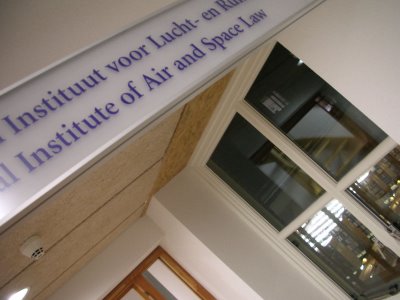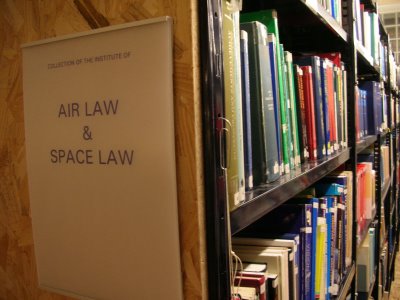11.29.2005
Postcards from Leiden




Looks like somebody found the law library at Leiden.
Wish I could take credit for these lovely, scholarly images, but this insider's view of some of the facilities at the International Institute of Air & Space Law, housed at the Faculty of Law of Leiden University, in Leiden, Netherlands come from intrepid LL.M student D. J. Den Herder, who put aside his digital camera and law treatises for a quick Space Law Probe Q&A about graduate studies in space law at world famous Leiden.
Staring with the obvious:
Q: Why did you want more torture after graduating law school?
A: I'm a glutton for punishment.
And continuing on with...
Q: How did you pick Leiden?
Leiden has developed a reputation as the premiere International Air & Space Law LL.M. program for students who desire a truly international degree and are looking to open trans-Atlantic doors. I was first turned onto the program by an alum who is now a senior attorney at NASA. From an aviation standpoint, the European perspective on international civil air transport is almost priceless. Just today in class we discussed for two hours the recent developments in, and issues facing, the proposed US-EC Open Aviation Area. The faculty is outstanding and augmented with guest lecturers who are truly the experts in the field. From a space standpoint, as you know, much of public space law takes shape in Europe (the UN OOSA is in Vienna), and learning about the European private space scene first-hand is irreplaceable. Courses are also periodically held at Leiden University's Grotius Centre for International Legal Studies in The Hague, which, as you know, is basically the cradle of international law.
The other well established Air & Space LL.M. program I'm aware of is at McGill University in Montreal.
Q: Tell us a bit about the Leiden program?
It's a year-long program, all in English, from September to September. The requirements are two semesters in residence and a minimum six-week apprenticeship/internship in the field, together with a Master's Thesis, due at the end.
In class, I sit alongside pilots, engineers, policy wonks, and others with diverse
experience and interest in the aerospace biz. There's also a blended learning program for those already ensconced in practice, which requires two weeks of residence in the fall and again in the winter, a thesis, and makes use of the digital learning environment.
Q: What classes are you taking?
This semester my courses include Private Air Law, Public Air Law, and EC Air Law, along with "seminars" on more specific topics, such as aircraft financing, which is a part of the private air law course. Next semester the main focus is space law (public and private), as well as the laws of competition. Of course, thesis research will consume an increasing amount of time as the year goes on. You can find a full course overview on the website. There are also opportunities to participate in various extracurriculars, such as the Lachs moot court competition.
Q: What are your plans for after graduation and what kinds of space law-related jobs and career opportunities intererest you most?
Without going into too much detail, I'd say I'm most interested in the commercial space business -- and specifically the financial and legal structures that make these commercial space deals possible. There are some exciting developments taking place right now in the field of international secured transactions in mobile equipment financing, including space equipment, and these are particularly interesting in light of the shifting nature of low earth orbit operations, which, as NASA administrator Griffin has recently espoused, is gearing toward a truly market-based paradigm. I believe that given the necessary financial liberty and regulatory certainty, the private sector can and will be prepared to meet both existing and future opportunities on the final frontier.
Q: How did your interest in space law begin?
I've been interested in space ever since I can remember. My parents took us to visit the Cape when I was like 8, and it's been a fascination for me ever since. In school my interests were manifested in literature and eventually the law. I hadn't necessarily considered the space biz to be a viable career path until I read several books in law school -- starting with Space: The Next Business Frontier by Lou Dobbs and HP Newquist. Right around then I decided: This is what I want to do. And I haven't looked back.
* * *
Thanks, D.J.!
We'll be looking forward to updates as D.J. writes his thesis by day and fights random space crime as it happens. Of course, we also welcome any juicy gossip that's fit to post about nightlife in Leiden, The Hague and Amsterdam. (Although, typically, what happens in the Netherlands must stay in the Netherlands.)
Meanwhile, I will naturally pass along any inquiries from law firms or space companies interested in interviewing D.J. for a job. (And since he's such a hot pick, this once I'll even waive my usual finder's fee.)






